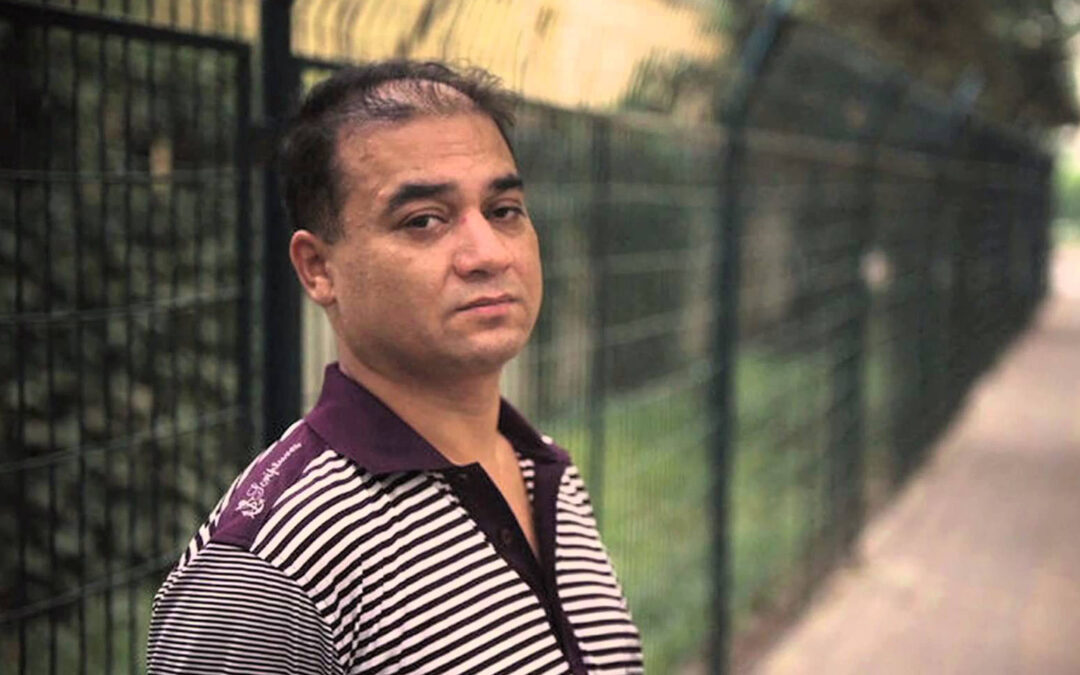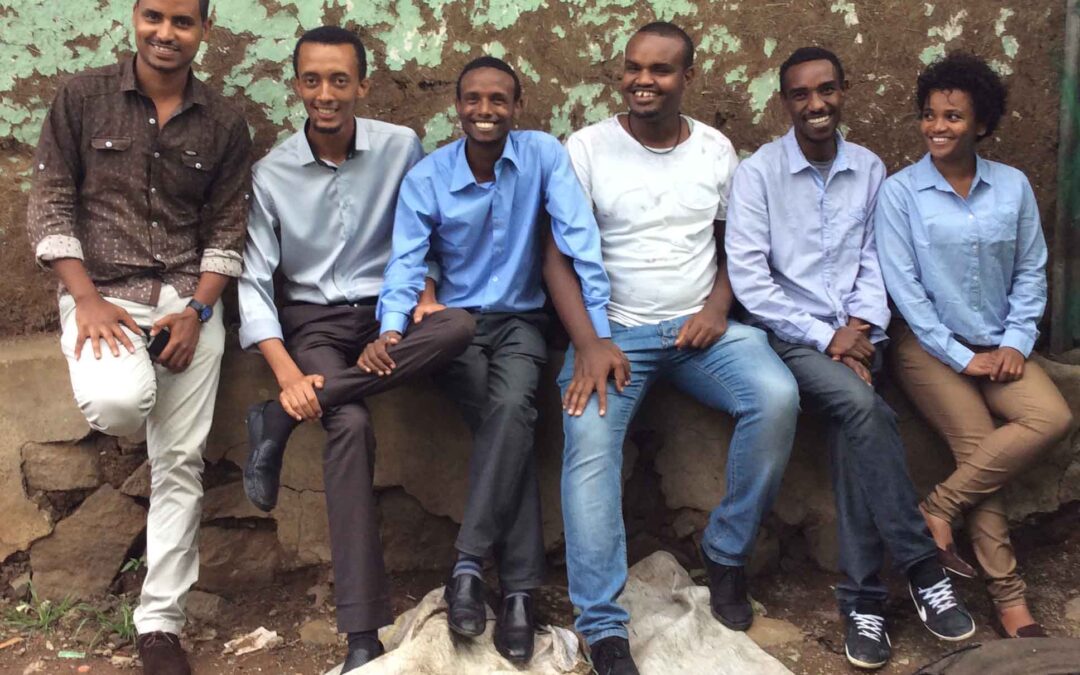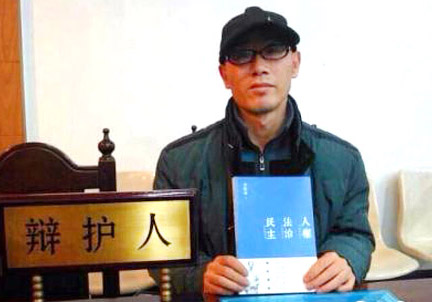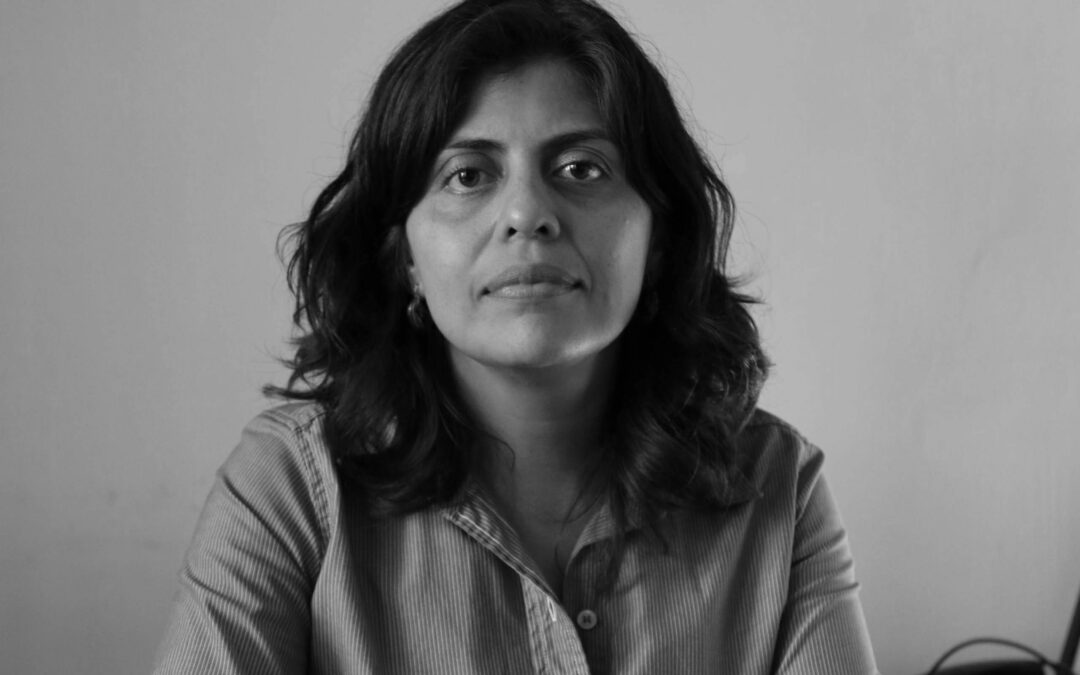
Oct 11, 2016 | Multimedia items, News, Video clips
Selected by a jury of 10 global human rights organizations, including the ICJ, Ilham Tohti has worked for two decades to foster dialogue and understanding between Uyghurs and Han Chinese. Detained in China, he could not travel to collect his prize in Geneva.
A renowned Uyghur intellectual in China, Ilham Tohti (photo) has rejected separatism and violence, and sought reconciliation based on a respect for Uyghur culture, which has been subject to religious, cultural and political repression in the Xinjiang Uyghur Autonomous Region.
In 1994 he began to write about problems and abuses in Xinjiang, which led to official surveillance.
From 1999 to 2003 he was barred from teaching.
Since then the authorities have also made it impossible for him to publish in normal venues.
As a response, he turned to the Internet to broaden public awareness of the economic, social and developmental issues confronting the Uyghurs.
In 2006 he established Uyghurbiz.net, a Chinese-language site, to foster dialogue and understanding between Uyghurs and Han Chinese.
Over the course of its existence, it has been shut down periodically, and people writing for it have been harassed.
In 2009, he was arrested for several weeks after posting information on Uyghurs who had been arrested, killed and “disappeared” during and after protests.
In the following years he was periodically subjected to house arrest, and in 2013, while bound to take up a post as a visiting scholar at Indiana University, USA, he was detained at the airport and prevented from leaving China.
On January 15, 2014, Ilham Tohti was arrested on charges of separatism and sentenced to life imprisonment, after a two-day trial.
Numerous statements were issued by Western governments and the European Union condemning his trial and sentence, and in early 2016 several hundred academics petitioned the Chinese leadership for his release.
Upon his nomination as a Finalist for the Martin Ennals Award earlier this year, his daughter stated: “My father Ilham Tohti has used only one weapon in his struggle for the basic rights of the Uyghurs of Xinjiang: Words; spoken, written, distributed, and posted. This is all he has ever had at his disposal, and all that he has ever needed. And this is what China found so threatening. A person like him doesn’t deserve to be in prison for even a day.”
Martin Ennals Foundation Chair Dick Oosting said: “The real shame of this situation is that by eliminating the moderate voice of Ilham Tohti the Chinese Government is in fact laying the groundwork for the very extremism it says it wants to prevent.”
The two other finalists received Martin Ennals Prizes.
Zone 9 Bloggers (Ethiopia) are nine young activists who called themselves ‘Zone 9’ as a symbol for Ethiopia as a whole (Kality prison in Ethiopia, has 8 zones and holds many journalists and political prisoners).
They document human rights abuses and shed light on the situation of political prisoners in Ethiopia.
Six of its members were arrested and charged with terrorism.
Although they have now been released, three are in exile while four of the six remaining in Ethiopia are still facing charges and banned from travel.
Razan Zaitouneh (Syria) has dedicated her life to defending political prisoners, documenting violations, and helping others free themselves from oppression.
She founded the Violations Documentation Center (VDC), which documents the death toll and ill-treatment in Syria’s prisons.
She had started to cover all sides in the conflict when she was kidnapped, alongside with her husband and two colleagues, on 9 December 2013. Her whereabouts remain unknown.
Background
The “Nobel Prize of Human Rights”, the Martin Ennals Award for Human Rights Defenders (MEA) is a unique collaboration among ten of the world’s leading human rights organizations to give protection to human rights defenders worldwide.
Strongly supported by the City of Geneva, the award is given to Human Rights Defenders who have shown deep commitment and face great personal risk. Its aim is to provide protection through international recognition.
The Jury is composed of the following NGOs: ICJ, Amnesty International, Human Rights Watch, Human Rights First, Int’l Federation for Human Rights, World Organisation Against Torture, Front Line Defenders, EWDE Germany, International Service for Human Rights, and HURIDOCS.
Contact:
Michael Khambatta, Director, Martin Ennals Foundation, t: +41 79 474 8208, e: khambatta(a)martinennalsaward.org
Olivier van Bogaert, Director, ICJ Media and Communications, and ICJ Representative on the MEA Jury, t: +41 22 979 38 08, e: olivier.vanbogaert(a)icj.org
china-mea-laureate-2016-news-press-releases-2016-chi (full text in Chinese, PDF)
Watch the Martin Ennals Award Ceremony 2016:
Watch the Ilham Tohti movie:

Apr 27, 2016 | News
The three human rights defenders selected for the award are Zone 9 Bloggers (Ethiopia), Ilham Tohti (China) and Razan Zaitouneh (Syria). The ICJ is member of the MEA Jury.
The Martin Ennals Award for Human Rights Defenders (MEA) is the main award of the human rights movement and as such can be labelled as the Nobel Price for human rights.
It is a unique collaboration among ten of the world’s leading human rights organizations to give protection to human rights defenders worldwide.
This award is selected by the International Human Rights Community (members of the jury are ICJ, Amnesty International, Human Rights Watch, Human Rights First, International Federation for Human Rights, World Organisation Against Torture, Front Line Defenders, EWDE Germany, International Service for Human Rights and HURIDOCS).
It is given to Human Rights Defenders who have shown deep commitment and face great personal risk.
The aim of the award is to highlight their work and protect them through increased visibility.
The MEA Award 2016 will be presented on October. 11th at a ceremony hosted by the City of Geneva.
Kality prison in Ethiopia, which holds many journalists and political prisoners, has 8 zones. Zone 9 Bloggers selected their name as a symbol for Ethiopia as a whole where political freedoms are severely restricted.
They write opinion pieces and feature articles that focus on the constitution, economic, educational and cultural issues. They document human rights abuses and violations of law by both state and non-state actors.
Furthermore, they shed light on the situation of political prisoners in Ethiopia.
Two weeks after creating their blog, it was blocked. Two years later six of its members (photo) were arrested and charged with terrorism.
Although they have now been released, three are in exile while those still in Ethiopia are banned from travel.
They said: “We are extremely humbled to be nominated for the Martin Ennals Award. This recognition raises our visibility enough to increase our safety, and also shows that the World is the home of the same family. It is proof that when one part of the world is silenced, the rest will speak on behalf of it. This recognition will definitely motivate us to push forward on our struggle to create a better Ethiopia where human rights are respected.”
A renowned Uyghur intellectual in China, Ilham Tohti has worked for two decades to foster dialogue and understanding between Uyghurs and Han Chinese.
He has rejected separatism and sought reconciliation based on a respect for Uyghur culture.
Beginning in 1994, he began to write about problems and abuses in Xinjiang, which led to official surveillance.
From 1999 to 2003 he was barred from teaching, after posting information on Uyghurs who had been arrested, killed and “disappeared” during and after protests. Ilham Tohti was arrested on January 15, 2014.
He was charged with separatism and sentenced to life imprisonment after a two-day trial.
A prominent human rights lawyer, activist, and journalist in Syria, Razan Zaitouneh has dedicated her life to defending political prisoners, documenting crimes against humanity, and helping others free themselves from oppression. This resulted in a travel ban in 2002.
Following the beginning of the conflict in 2011, she founded the Violations Documentation Center (VDC), which documents the death toll and ill-treatment in Syria’s prisons.
On December 9, 2013, a group of masked gunmen stormed the VDC office in Douma, near Damascus, and kidnapped Razan along with her husband, Wael Hamada, and two colleagues. Their whereabouts remain unknown.
Contact:
Olivier van Bogaert, Director Media & Communications, ICJ representative in the MEA Jury, t: +41 22 979 38 08 ; e: olivier.vanbogaert(a)icj.org
Michael Khambatta, Director, Martin Ennals Foundation, t: +41 79 474 8208 ; e: khambatta(a)martinennalsaward.org
Dec 3, 2015
C. Principal subjects of concern and recommendations Lesbian, gay, bisexual, transgender and intersex persons 55. The Committee is concerned about reports that private and publicly run clinics offer the so-called “gay conversion therapy” to change the sexual...

Dec 17, 2014 | News
Mr Chang Boyang, whose case ICJ raised in a letter to Chinese President Xi Jinping in September calling for his release, has been released on bail.
Mr Boyang, a lawyer working among other things to promote the rights of persons with disabilities in China, had been arrested and charged for activities that should have been recognized to be well within the scope of his professional role and his freedom of expression and association. The ICJ was informed today that Chang Boyang was released on bail on 29 November.
In another update, the ICJ has also been informed that Beijing-based lawyer Pu Zhiqiang, whose case was also raised in the letter to President Xi Jinping, has had additional charges brought against him. He remains in detention while his case has been sent back to police for further investigation, which is in turn likely to prolong his pre-trial detention. His lawyer reportedly said that Pu has already been interrogated 60 to 70 times, with each session lasting more than 10 hours.
The ICJ has not received any reply to its letter of 1 September 2014 to Chinese President Xi Jinping.
The ICJ remains deeply concerned about the situation of lawyers who raise human rights issues or otherwise act on cases the Chinese government deems to be sensitive. Those held in detention should be immediately released, and all criminal proceedings based on lawyers’ due discharge of their professional functions, or exercise of freedom of expression, association or assembly, must be dropped.
The ICJ Practitioner’s Guide no 1 on independence of judges, lawyers and prosecutors is available here in a variety of languages, including Chinese.

Oct 7, 2014 | Multimedia items, News, Video clips
Alejandra Ancheita, founder and Executive Director of ProDESC, is one of the pioneers in seeking accountability for transnational companies in Mexican courts when local communities’ rights are not taken into account.
Alejandra Ancheita has worked with migrants, workers, and indigenous communities for over 15 years to protect their land and labour rights vis a vis transnational mining and energy companies.
These disputes have included violent attacks on those she is trying to protect.
In Mexico, there is a clear pattern of attacks, threats, criminalization, and murders of human rights defenders.
Alejandra Ancheita and ProDESC have been subjected to surveillance, a defamation campaign in the national media, and a break in at their offices.
“This recognition calls attention to the increasing violence being suffered by human rights defenders in Mexico, particularly women defenders,” she said. “I hope that it will provide better conditions and increased security not just for me, but for all human rights defenders in my country.”
“The ICJ is extremely pleased by the decision to pay tribute to the work of Alejandra Ancheita, not only because of her outstanding commitment and courage as an individual, but also because of the recognition that this award will provide to the area of human rights work that she has been dedicating herself to for many years,” said Olivier van Bogaert, ICJ Director of Media and Communications, and ICJ Representative on the MEA Jury.
The ICJ which also developed a longstanding work on economic, social and cultural rights, and on business and human rights, will devote the 2014 edition of its Geneva Forum for judges and lawyers to the role of courts in protecting economic, social and cultural rights.
The two other finalists, Cao Shunli (China) and Adilur Rahman Khan (Bangladesh), received Martin Ennals Prizes.
Cao Shunli, who died in in detention in March 14th after being denied medical attention for known health conditions had vigorously advocated for access to information, freedom of speech, and freedom of assembly.
She disappeared in September 2013 shortly before boarding a flight order to participate in the Human Rights Council.
Chinese authorities only acknowledged her detention months later.
A special foundation is planned in her honor.
Since the 1990’s, Adilur Rahman Khan worked on a wide range of human rights issues, such as illegal detention, enforced disappearances, and extra-judicial killings.
Personally he is facing criminal prosecution for documenting the extrajudicial deaths of 61 people during demonstrations against the government.
His organization, Odhikar, is one of the few independent voices left in Bangladesh.
It is facing closure as donor funds destined for Odhikar are being blocked by the Prime Minister’s Office.
The “Nobel Prize of Human Rights”, the Martin Ennals Award for Human Rights Defenders (MEA) is a unique collaboration among ten of the world’s leading human rights organizations to give protection to human rights defenders worldwide.
Strongly supported by the City of Geneva, the award is given to Human Rights Defenders who have shown deep commitment and face great personal risk. Its aim is to provide protection through international recognition.
The Jury is composed of the following NGOs: ICJ, Amnesty International, Human Rights Watch, Human Rights First, Int’l Federation for Human Rights, World Organisation Against Torture, Front Line Defenders, EWDE Germany, International Service for Human Rights, and HURIDOCS.
Contact:
Michael Khambatta, Director Martin Ennals Foundation, t: +41 79 474 8208, e: khambatta(a)martinennalsaward.org
Olivier van Bogaert, ICJ Director of Media and Communications, and ICJ Representative on the MEA Jury, t: +41 22 979 38 08, e: olivier.vanbogaert(a)icj.org
Multimedia gallery:
Livestreaming of the Martin Annals Award 2014 Ceremony
Alejandra Acheita film:
Cao Shunli film:
Adilur Rahman Kahn film:








